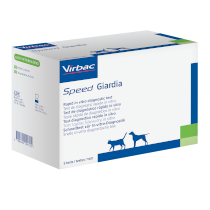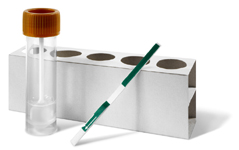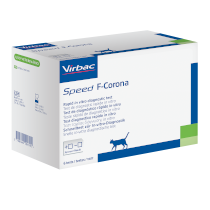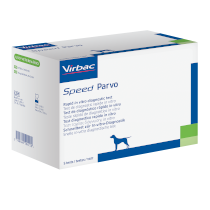Rapid tests
Speed Giardia
Detection test for Giardia intestinalis (or duodenalis) cyst antigens in dogs, cats and bovine.
Quick and simple, Speed Giardia can be done in a visit in 10 minutes only.
- Detection of Giardia shedders
- Monitoring of reinfestation after treatment
For veterinary use only.
Product specifications
| Sample | Feces |
|---|---|
| Target species | Dogs, cats, bovines |
| Handlings | 5 minutes |
| Results | 5 minutes |
| Storage | Long shelf life of 16 months at room temperature (+2°C - 30°C) |
| Presentation | Boxes of 5 tests |
Why use Speed Giardia ?
Giardiasis is a parasitic disease caused by colonization of the intestinal mucosa by Giardia duodenalis, a common enteric parasite.This zoonosis affects dogs, cats and other mammals. Adult hosts are most of the time healthy carriers, whereas in young animals or immunoincompetent ones, the parasite is responsible for chronic, intermittent and often wattery diarrhea.
Infestation of young animals by ingestion of cysts (in drinking water) leads to maldigestion-malabsorption syndrome and growth retardation.
Giardia prevalence varies according to host species:
- 6 to 33% of dogs are carriers (2)
- 4 to 14% of cats (2)
- 1 to 4% of diarrheic calves (3,4)
Speed Giardia enables to identify shedding animals by detecting Giardia cysts in canine, feline and bovine species. Quick diagnosis enables specific treatment to be initiated at the first sign of disease, reducing the chance of chronic disease, reinfestation, and contamination of the environment and other animals.
When to use Speed Giardia ?
In young dogs and cats, Speed Giardia is recommended for chronic watery, intermittent diarrhea that persists despite first-line treatment.
In the event of a negative result, the test can be repeated by collecting stools over several days, as the excretion of giardia cysts may be intermittent.
Speed Giardia is indicated for chronic diarrhea in older cats.
In young calves aged 8 days to 6 months, Speed Giardia helps identify the cause of diarrhoea responsible for stunted growth and economic losses.
Speed Giardia is indicated for follow-up treatment against giardiosis.
Quick guide
For complete instruction, please refer to the product notice.
1. Take a level spoonful of faeces and add it to the buffer. Homogenize and and leave it to sediment for 3 minutes.
2. Take a new test strip and dip it into the reagent in the direction indicated by the arrow, without immersing the central test band.Allow to stand for 1 minute.
3. Remove the strip and place it on a horizontal surface. Read the result after 5 minutes.
Performance de Speed Giardia
| Reference method N=72 | Microscopy | ELISA |
| Sensitivity | 90.7% | 94.1% |
| Specificity | 69% | 100% |
References
(1) Etude interne BVT Speed Giardia sur 121 animaux.
(2) THIRY E. La maladie de Carré. Virologie clinique du chien et du chat, 2002, Ed. Point Vétérinaire – 180p
(3) Enquête épidémiologique. Semaine Vétérinaire, 22 Janvier 2005, 1167
(4) PIERSON P. Conduite à tenir face à un épisode de diarrhée aiguë en élevage canin. Nouveau Praticien Vétérinaire, 2003, 14, 257-263





